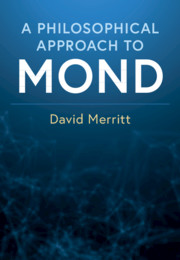Book contents
- Frontmatter
- Dedication
- Contents
- Preface
- 1 The Epistemology of Science
- 2 The Methodology of Scientific Research Programs
- 3 The Milgromian Research Program
- 4 Theory Variant T0: The Foundational Postulates
- 5 Theory Variant T1: A Non-relativistic Lagrangian
- 6 Theory Variant T2: A Relativistic Theory
- 7 Theory Variant T3: A Modified Hard Core
- 8 Convergence
- 9 Summary / Final Thoughts
- References
- Index
2 - The Methodology of Scientific Research Programs
Published online by Cambridge University Press: 20 April 2020
- Frontmatter
- Dedication
- Contents
- Preface
- 1 The Epistemology of Science
- 2 The Methodology of Scientific Research Programs
- 3 The Milgromian Research Program
- 4 Theory Variant T0: The Foundational Postulates
- 5 Theory Variant T1: A Non-relativistic Lagrangian
- 6 Theory Variant T2: A Relativistic Theory
- 7 Theory Variant T3: A Modified Hard Core
- 8 Convergence
- 9 Summary / Final Thoughts
- References
- Index
Summary
Karl Popper’s logical and epistemological insights are the basis of a widely used methodology for judging the success of scientific theories – or more accurately, of scientific “research programs,” defined as the evolving set of theories that share a common set of assumptions (or “paradigm” in the language of Thomas Kuhn). Imre Lakatos’s Methodology of Scientific Research Programs judges an evolving theory in terms of how it responds to falsifying instances – via ad hoc adjustments (bad) or via content-increasing hypotheses (good) – and how well it predicts facts in advance of their discovery. A theory that evolves in content-increasing ways, and that predicts novel facts in advance of their confirmation, is called “progressive”; a theory that fails to do so is called “degenerating.” Particularly important are predictions that differ from those of a competing theory – which in the case of MOND is the standard cosmological model.
Keywords
- Type
- Chapter
- Information
- A Philosophical Approach to MONDAssessing the Milgromian Research Program in Cosmology, pp. 20 - 42Publisher: Cambridge University PressPrint publication year: 2020

